Artificial Intelligence and Ethical Considerations Essay BUSM3115
VerifiedAdded on 2022/10/03
|8
|2808
|29
Essay
AI Summary
This essay delves into the complex ethical and governance issues surrounding Artificial Intelligence (AI). It explores AI's increasing presence in various sectors, including research, business, and defense, highlighting both its potential benefits and associated risks. The essay examines the ethical dilemmas related to AI, such as unemployment concerns, the impact on personal lives, and the exacerbation of inequality. It discusses the role of AI in modern industries, arguing that AI can create new jobs and enhance productivity. The essay further analyzes the Australian government's approach to AI, emphasizing the importance of human accountability and clear regulations. It addresses the challenge of establishing uniform ethical standards for AI and explores the role of data, ethical principles, and regular updates in AI systems. The essay concludes by emphasizing the importance of ethical considerations in AI development and the potential for AI to contribute to human society, while acknowledging the need for ongoing research and training to ensure responsible AI practices.
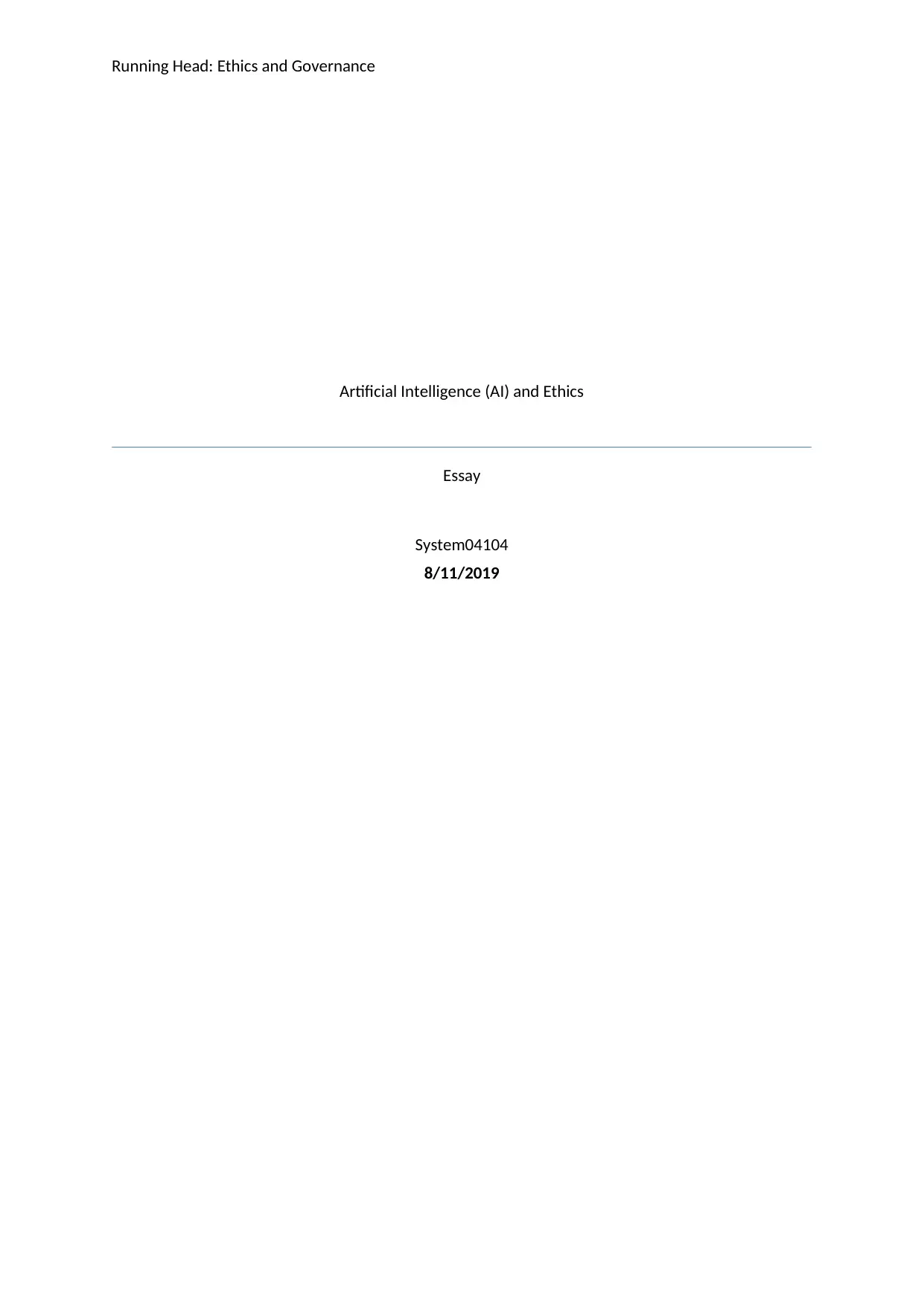
Running Head: Ethics and Governance
Artificial Intelligence (AI) and Ethics
Essay
System04104
8/11/2019
Artificial Intelligence (AI) and Ethics
Essay
System04104
8/11/2019
Paraphrase This Document
Need a fresh take? Get an instant paraphrase of this document with our AI Paraphraser
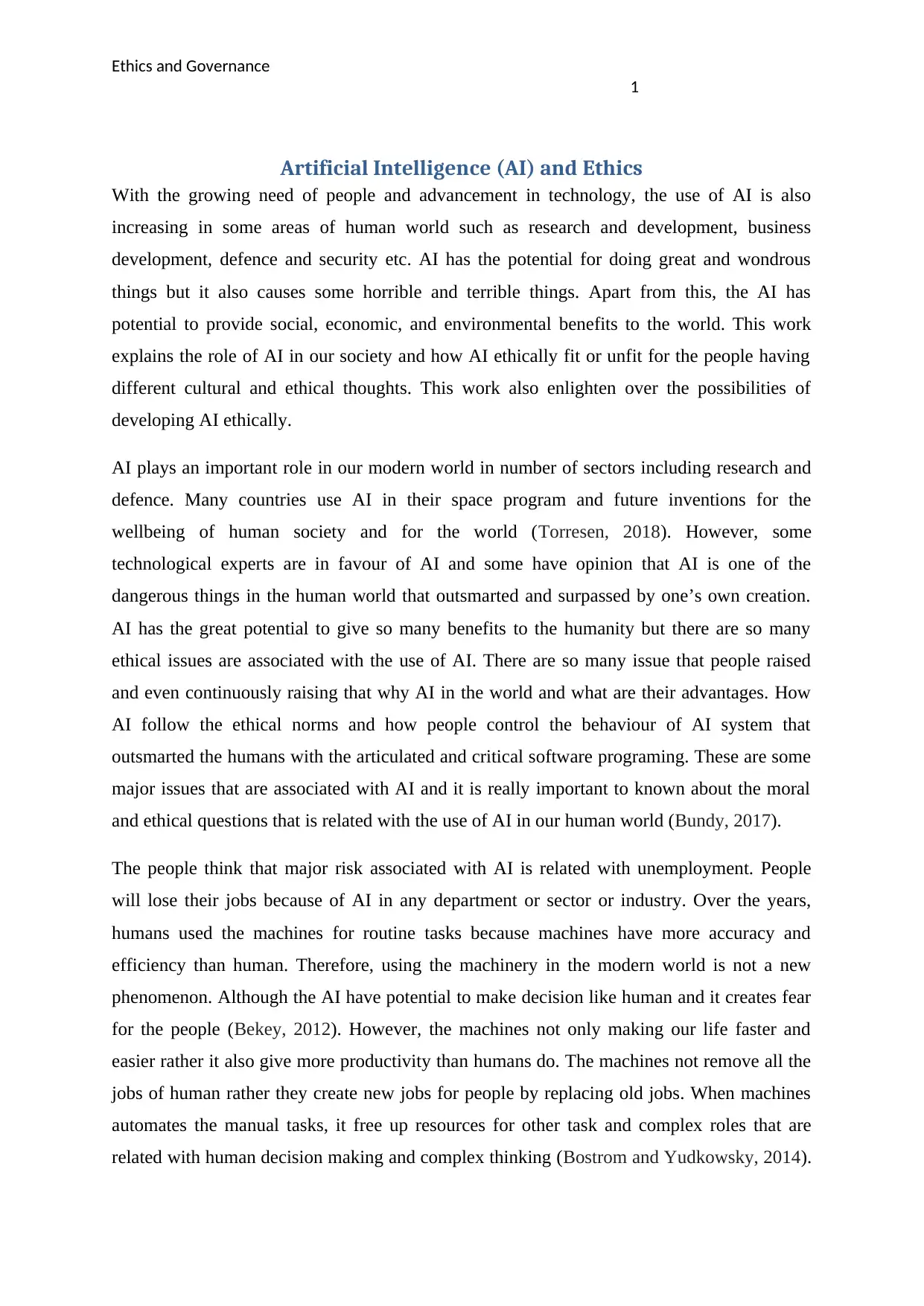
Ethics and Governance
1
Artificial Intelligence (AI) and Ethics
With the growing need of people and advancement in technology, the use of AI is also
increasing in some areas of human world such as research and development, business
development, defence and security etc. AI has the potential for doing great and wondrous
things but it also causes some horrible and terrible things. Apart from this, the AI has
potential to provide social, economic, and environmental benefits to the world. This work
explains the role of AI in our society and how AI ethically fit or unfit for the people having
different cultural and ethical thoughts. This work also enlighten over the possibilities of
developing AI ethically.
AI plays an important role in our modern world in number of sectors including research and
defence. Many countries use AI in their space program and future inventions for the
wellbeing of human society and for the world (Torresen, 2018). However, some
technological experts are in favour of AI and some have opinion that AI is one of the
dangerous things in the human world that outsmarted and surpassed by one’s own creation.
AI has the great potential to give so many benefits to the humanity but there are so many
ethical issues are associated with the use of AI. There are so many issue that people raised
and even continuously raising that why AI in the world and what are their advantages. How
AI follow the ethical norms and how people control the behaviour of AI system that
outsmarted the humans with the articulated and critical software programing. These are some
major issues that are associated with AI and it is really important to known about the moral
and ethical questions that is related with the use of AI in our human world (Bundy, 2017).
The people think that major risk associated with AI is related with unemployment. People
will lose their jobs because of AI in any department or sector or industry. Over the years,
humans used the machines for routine tasks because machines have more accuracy and
efficiency than human. Therefore, using the machinery in the modern world is not a new
phenomenon. Although the AI have potential to make decision like human and it creates fear
for the people (Bekey, 2012). However, the machines not only making our life faster and
easier rather it also give more productivity than humans do. The machines not remove all the
jobs of human rather they create new jobs for people by replacing old jobs. When machines
automates the manual tasks, it free up resources for other task and complex roles that are
related with human decision making and complex thinking (Bostrom and Yudkowsky, 2014).
1
Artificial Intelligence (AI) and Ethics
With the growing need of people and advancement in technology, the use of AI is also
increasing in some areas of human world such as research and development, business
development, defence and security etc. AI has the potential for doing great and wondrous
things but it also causes some horrible and terrible things. Apart from this, the AI has
potential to provide social, economic, and environmental benefits to the world. This work
explains the role of AI in our society and how AI ethically fit or unfit for the people having
different cultural and ethical thoughts. This work also enlighten over the possibilities of
developing AI ethically.
AI plays an important role in our modern world in number of sectors including research and
defence. Many countries use AI in their space program and future inventions for the
wellbeing of human society and for the world (Torresen, 2018). However, some
technological experts are in favour of AI and some have opinion that AI is one of the
dangerous things in the human world that outsmarted and surpassed by one’s own creation.
AI has the great potential to give so many benefits to the humanity but there are so many
ethical issues are associated with the use of AI. There are so many issue that people raised
and even continuously raising that why AI in the world and what are their advantages. How
AI follow the ethical norms and how people control the behaviour of AI system that
outsmarted the humans with the articulated and critical software programing. These are some
major issues that are associated with AI and it is really important to known about the moral
and ethical questions that is related with the use of AI in our human world (Bundy, 2017).
The people think that major risk associated with AI is related with unemployment. People
will lose their jobs because of AI in any department or sector or industry. Over the years,
humans used the machines for routine tasks because machines have more accuracy and
efficiency than human. Therefore, using the machinery in the modern world is not a new
phenomenon. Although the AI have potential to make decision like human and it creates fear
for the people (Bekey, 2012). However, the machines not only making our life faster and
easier rather it also give more productivity than humans do. The machines not remove all the
jobs of human rather they create new jobs for people by replacing old jobs. When machines
automates the manual tasks, it free up resources for other task and complex roles that are
related with human decision making and complex thinking (Bostrom and Yudkowsky, 2014).
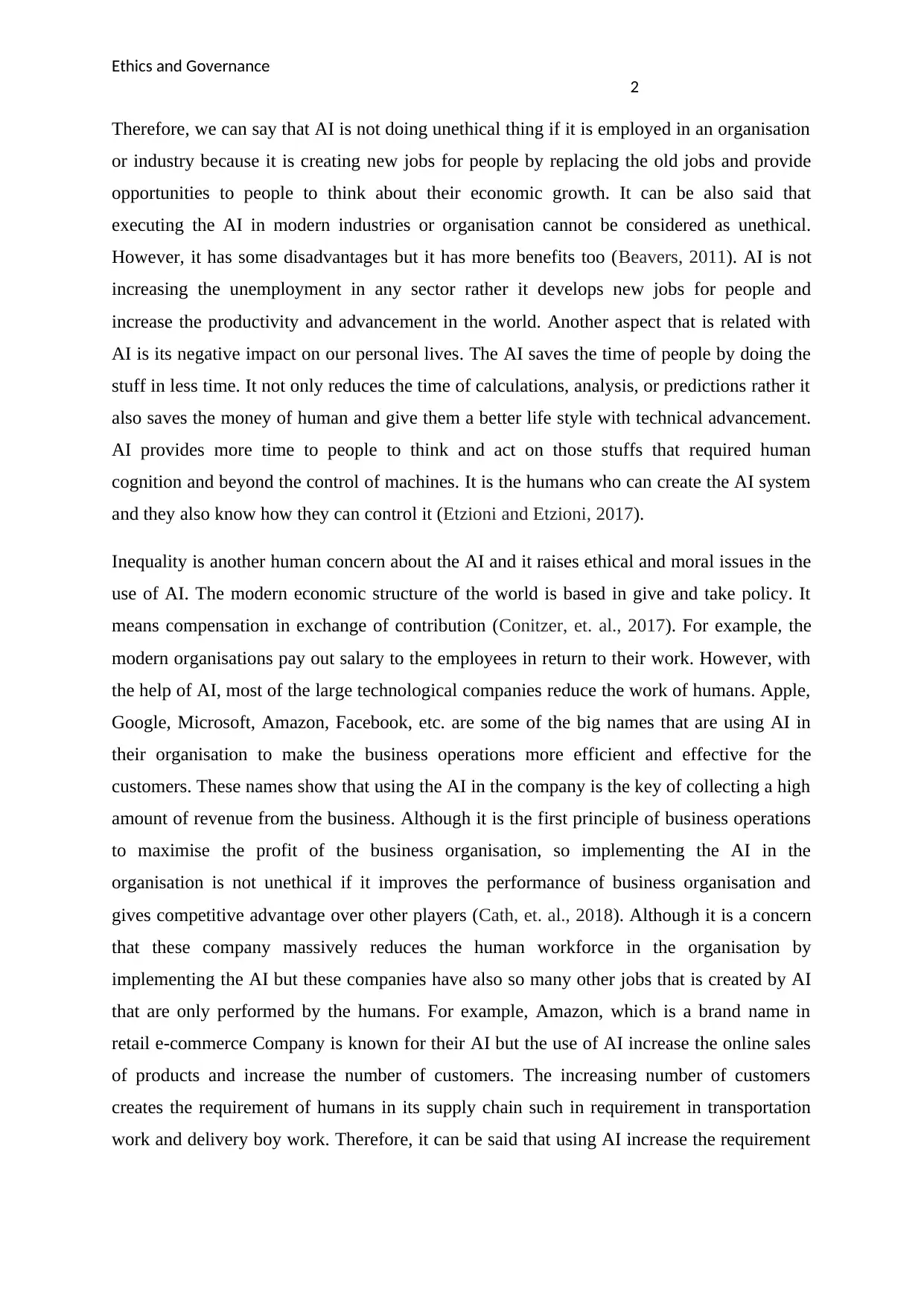
Ethics and Governance
2
Therefore, we can say that AI is not doing unethical thing if it is employed in an organisation
or industry because it is creating new jobs for people by replacing the old jobs and provide
opportunities to people to think about their economic growth. It can be also said that
executing the AI in modern industries or organisation cannot be considered as unethical.
However, it has some disadvantages but it has more benefits too (Beavers, 2011). AI is not
increasing the unemployment in any sector rather it develops new jobs for people and
increase the productivity and advancement in the world. Another aspect that is related with
AI is its negative impact on our personal lives. The AI saves the time of people by doing the
stuff in less time. It not only reduces the time of calculations, analysis, or predictions rather it
also saves the money of human and give them a better life style with technical advancement.
AI provides more time to people to think and act on those stuffs that required human
cognition and beyond the control of machines. It is the humans who can create the AI system
and they also know how they can control it (Etzioni and Etzioni, 2017).
Inequality is another human concern about the AI and it raises ethical and moral issues in the
use of AI. The modern economic structure of the world is based in give and take policy. It
means compensation in exchange of contribution (Conitzer, et. al., 2017). For example, the
modern organisations pay out salary to the employees in return to their work. However, with
the help of AI, most of the large technological companies reduce the work of humans. Apple,
Google, Microsoft, Amazon, Facebook, etc. are some of the big names that are using AI in
their organisation to make the business operations more efficient and effective for the
customers. These names show that using the AI in the company is the key of collecting a high
amount of revenue from the business. Although it is the first principle of business operations
to maximise the profit of the business organisation, so implementing the AI in the
organisation is not unethical if it improves the performance of business organisation and
gives competitive advantage over other players (Cath, et. al., 2018). Although it is a concern
that these company massively reduces the human workforce in the organisation by
implementing the AI but these companies have also so many other jobs that is created by AI
that are only performed by the humans. For example, Amazon, which is a brand name in
retail e-commerce Company is known for their AI but the use of AI increase the online sales
of products and increase the number of customers. The increasing number of customers
creates the requirement of humans in its supply chain such in requirement in transportation
work and delivery boy work. Therefore, it can be said that using AI increase the requirement
2
Therefore, we can say that AI is not doing unethical thing if it is employed in an organisation
or industry because it is creating new jobs for people by replacing the old jobs and provide
opportunities to people to think about their economic growth. It can be also said that
executing the AI in modern industries or organisation cannot be considered as unethical.
However, it has some disadvantages but it has more benefits too (Beavers, 2011). AI is not
increasing the unemployment in any sector rather it develops new jobs for people and
increase the productivity and advancement in the world. Another aspect that is related with
AI is its negative impact on our personal lives. The AI saves the time of people by doing the
stuff in less time. It not only reduces the time of calculations, analysis, or predictions rather it
also saves the money of human and give them a better life style with technical advancement.
AI provides more time to people to think and act on those stuffs that required human
cognition and beyond the control of machines. It is the humans who can create the AI system
and they also know how they can control it (Etzioni and Etzioni, 2017).
Inequality is another human concern about the AI and it raises ethical and moral issues in the
use of AI. The modern economic structure of the world is based in give and take policy. It
means compensation in exchange of contribution (Conitzer, et. al., 2017). For example, the
modern organisations pay out salary to the employees in return to their work. However, with
the help of AI, most of the large technological companies reduce the work of humans. Apple,
Google, Microsoft, Amazon, Facebook, etc. are some of the big names that are using AI in
their organisation to make the business operations more efficient and effective for the
customers. These names show that using the AI in the company is the key of collecting a high
amount of revenue from the business. Although it is the first principle of business operations
to maximise the profit of the business organisation, so implementing the AI in the
organisation is not unethical if it improves the performance of business organisation and
gives competitive advantage over other players (Cath, et. al., 2018). Although it is a concern
that these company massively reduces the human workforce in the organisation by
implementing the AI but these companies have also so many other jobs that is created by AI
that are only performed by the humans. For example, Amazon, which is a brand name in
retail e-commerce Company is known for their AI but the use of AI increase the online sales
of products and increase the number of customers. The increasing number of customers
creates the requirement of humans in its supply chain such in requirement in transportation
work and delivery boy work. Therefore, it can be said that using AI increase the requirement
⊘ This is a preview!⊘
Do you want full access?
Subscribe today to unlock all pages.

Trusted by 1+ million students worldwide
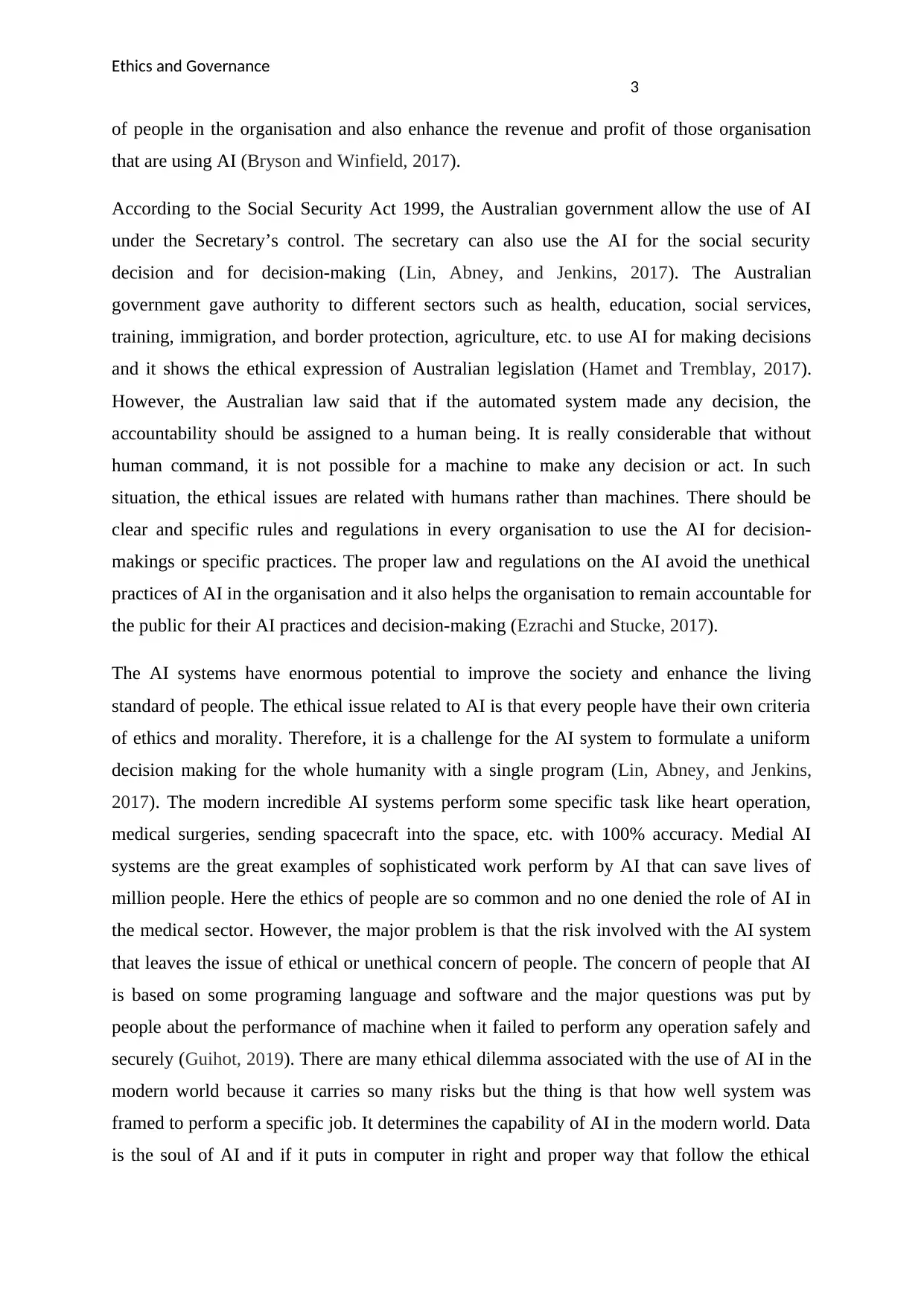
Ethics and Governance
3
of people in the organisation and also enhance the revenue and profit of those organisation
that are using AI (Bryson and Winfield, 2017).
According to the Social Security Act 1999, the Australian government allow the use of AI
under the Secretary’s control. The secretary can also use the AI for the social security
decision and for decision-making (Lin, Abney, and Jenkins, 2017). The Australian
government gave authority to different sectors such as health, education, social services,
training, immigration, and border protection, agriculture, etc. to use AI for making decisions
and it shows the ethical expression of Australian legislation (Hamet and Tremblay, 2017).
However, the Australian law said that if the automated system made any decision, the
accountability should be assigned to a human being. It is really considerable that without
human command, it is not possible for a machine to make any decision or act. In such
situation, the ethical issues are related with humans rather than machines. There should be
clear and specific rules and regulations in every organisation to use the AI for decision-
makings or specific practices. The proper law and regulations on the AI avoid the unethical
practices of AI in the organisation and it also helps the organisation to remain accountable for
the public for their AI practices and decision-making (Ezrachi and Stucke, 2017).
The AI systems have enormous potential to improve the society and enhance the living
standard of people. The ethical issue related to AI is that every people have their own criteria
of ethics and morality. Therefore, it is a challenge for the AI system to formulate a uniform
decision making for the whole humanity with a single program (Lin, Abney, and Jenkins,
2017). The modern incredible AI systems perform some specific task like heart operation,
medical surgeries, sending spacecraft into the space, etc. with 100% accuracy. Medial AI
systems are the great examples of sophisticated work perform by AI that can save lives of
million people. Here the ethics of people are so common and no one denied the role of AI in
the medical sector. However, the major problem is that the risk involved with the AI system
that leaves the issue of ethical or unethical concern of people. The concern of people that AI
is based on some programing language and software and the major questions was put by
people about the performance of machine when it failed to perform any operation safely and
securely (Guihot, 2019). There are many ethical dilemma associated with the use of AI in the
modern world because it carries so many risks but the thing is that how well system was
framed to perform a specific job. It determines the capability of AI in the modern world. Data
is the soul of AI and if it puts in computer in right and proper way that follow the ethical
3
of people in the organisation and also enhance the revenue and profit of those organisation
that are using AI (Bryson and Winfield, 2017).
According to the Social Security Act 1999, the Australian government allow the use of AI
under the Secretary’s control. The secretary can also use the AI for the social security
decision and for decision-making (Lin, Abney, and Jenkins, 2017). The Australian
government gave authority to different sectors such as health, education, social services,
training, immigration, and border protection, agriculture, etc. to use AI for making decisions
and it shows the ethical expression of Australian legislation (Hamet and Tremblay, 2017).
However, the Australian law said that if the automated system made any decision, the
accountability should be assigned to a human being. It is really considerable that without
human command, it is not possible for a machine to make any decision or act. In such
situation, the ethical issues are related with humans rather than machines. There should be
clear and specific rules and regulations in every organisation to use the AI for decision-
makings or specific practices. The proper law and regulations on the AI avoid the unethical
practices of AI in the organisation and it also helps the organisation to remain accountable for
the public for their AI practices and decision-making (Ezrachi and Stucke, 2017).
The AI systems have enormous potential to improve the society and enhance the living
standard of people. The ethical issue related to AI is that every people have their own criteria
of ethics and morality. Therefore, it is a challenge for the AI system to formulate a uniform
decision making for the whole humanity with a single program (Lin, Abney, and Jenkins,
2017). The modern incredible AI systems perform some specific task like heart operation,
medical surgeries, sending spacecraft into the space, etc. with 100% accuracy. Medial AI
systems are the great examples of sophisticated work perform by AI that can save lives of
million people. Here the ethics of people are so common and no one denied the role of AI in
the medical sector. However, the major problem is that the risk involved with the AI system
that leaves the issue of ethical or unethical concern of people. The concern of people that AI
is based on some programing language and software and the major questions was put by
people about the performance of machine when it failed to perform any operation safely and
securely (Guihot, 2019). There are many ethical dilemma associated with the use of AI in the
modern world because it carries so many risks but the thing is that how well system was
framed to perform a specific job. It determines the capability of AI in the modern world. Data
is the soul of AI and if it puts in computer in right and proper way that follow the ethical
Paraphrase This Document
Need a fresh take? Get an instant paraphrase of this document with our AI Paraphraser
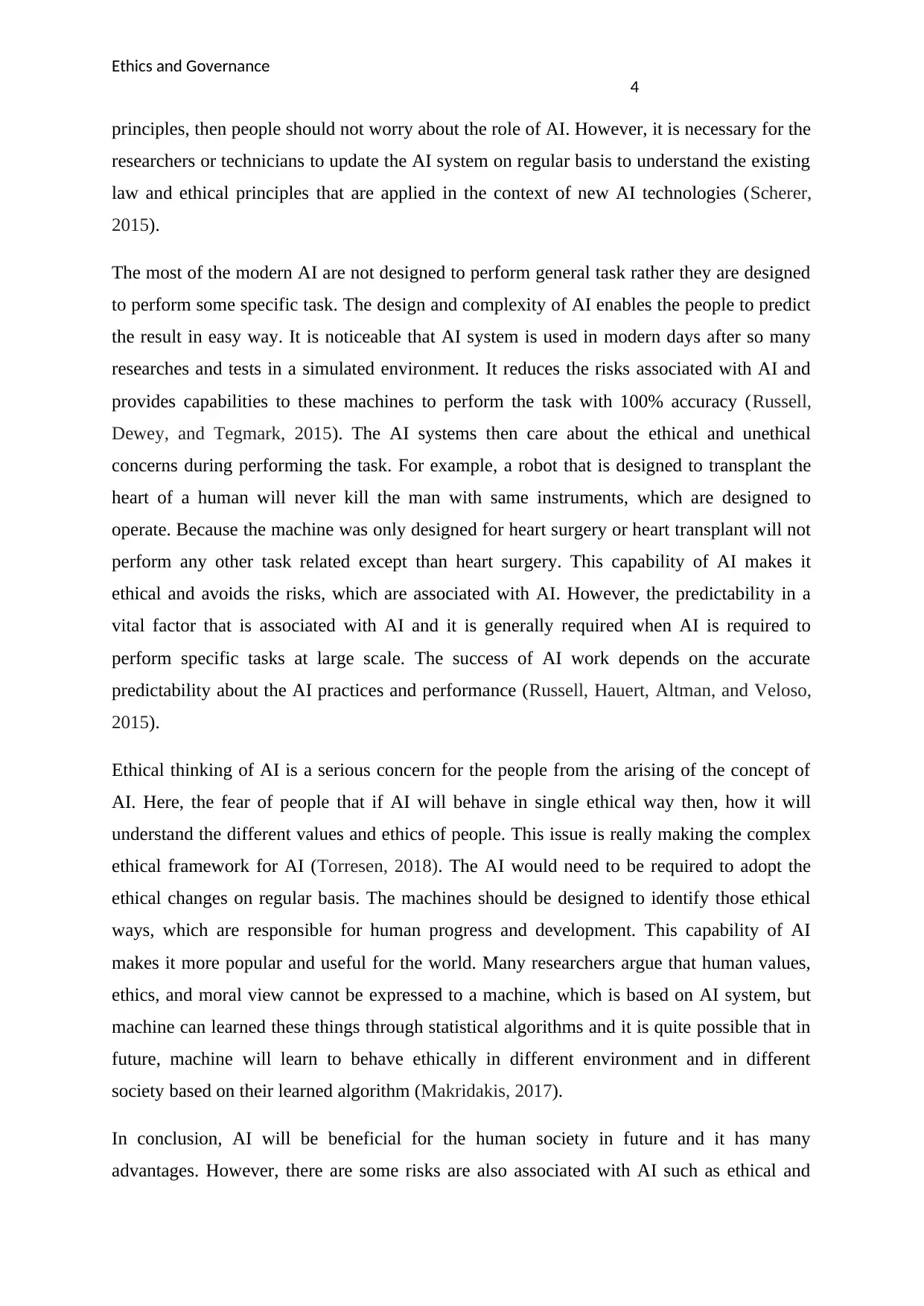
Ethics and Governance
4
principles, then people should not worry about the role of AI. However, it is necessary for the
researchers or technicians to update the AI system on regular basis to understand the existing
law and ethical principles that are applied in the context of new AI technologies (Scherer,
2015).
The most of the modern AI are not designed to perform general task rather they are designed
to perform some specific task. The design and complexity of AI enables the people to predict
the result in easy way. It is noticeable that AI system is used in modern days after so many
researches and tests in a simulated environment. It reduces the risks associated with AI and
provides capabilities to these machines to perform the task with 100% accuracy (Russell,
Dewey, and Tegmark, 2015). The AI systems then care about the ethical and unethical
concerns during performing the task. For example, a robot that is designed to transplant the
heart of a human will never kill the man with same instruments, which are designed to
operate. Because the machine was only designed for heart surgery or heart transplant will not
perform any other task related except than heart surgery. This capability of AI makes it
ethical and avoids the risks, which are associated with AI. However, the predictability in a
vital factor that is associated with AI and it is generally required when AI is required to
perform specific tasks at large scale. The success of AI work depends on the accurate
predictability about the AI practices and performance (Russell, Hauert, Altman, and Veloso,
2015).
Ethical thinking of AI is a serious concern for the people from the arising of the concept of
AI. Here, the fear of people that if AI will behave in single ethical way then, how it will
understand the different values and ethics of people. This issue is really making the complex
ethical framework for AI (Torresen, 2018). The AI would need to be required to adopt the
ethical changes on regular basis. The machines should be designed to identify those ethical
ways, which are responsible for human progress and development. This capability of AI
makes it more popular and useful for the world. Many researchers argue that human values,
ethics, and moral view cannot be expressed to a machine, which is based on AI system, but
machine can learned these things through statistical algorithms and it is quite possible that in
future, machine will learn to behave ethically in different environment and in different
society based on their learned algorithm (Makridakis, 2017).
In conclusion, AI will be beneficial for the human society in future and it has many
advantages. However, there are some risks are also associated with AI such as ethical and
4
principles, then people should not worry about the role of AI. However, it is necessary for the
researchers or technicians to update the AI system on regular basis to understand the existing
law and ethical principles that are applied in the context of new AI technologies (Scherer,
2015).
The most of the modern AI are not designed to perform general task rather they are designed
to perform some specific task. The design and complexity of AI enables the people to predict
the result in easy way. It is noticeable that AI system is used in modern days after so many
researches and tests in a simulated environment. It reduces the risks associated with AI and
provides capabilities to these machines to perform the task with 100% accuracy (Russell,
Dewey, and Tegmark, 2015). The AI systems then care about the ethical and unethical
concerns during performing the task. For example, a robot that is designed to transplant the
heart of a human will never kill the man with same instruments, which are designed to
operate. Because the machine was only designed for heart surgery or heart transplant will not
perform any other task related except than heart surgery. This capability of AI makes it
ethical and avoids the risks, which are associated with AI. However, the predictability in a
vital factor that is associated with AI and it is generally required when AI is required to
perform specific tasks at large scale. The success of AI work depends on the accurate
predictability about the AI practices and performance (Russell, Hauert, Altman, and Veloso,
2015).
Ethical thinking of AI is a serious concern for the people from the arising of the concept of
AI. Here, the fear of people that if AI will behave in single ethical way then, how it will
understand the different values and ethics of people. This issue is really making the complex
ethical framework for AI (Torresen, 2018). The AI would need to be required to adopt the
ethical changes on regular basis. The machines should be designed to identify those ethical
ways, which are responsible for human progress and development. This capability of AI
makes it more popular and useful for the world. Many researchers argue that human values,
ethics, and moral view cannot be expressed to a machine, which is based on AI system, but
machine can learned these things through statistical algorithms and it is quite possible that in
future, machine will learn to behave ethically in different environment and in different
society based on their learned algorithm (Makridakis, 2017).
In conclusion, AI will be beneficial for the human society in future and it has many
advantages. However, there are some risks are also associated with AI such as ethical and
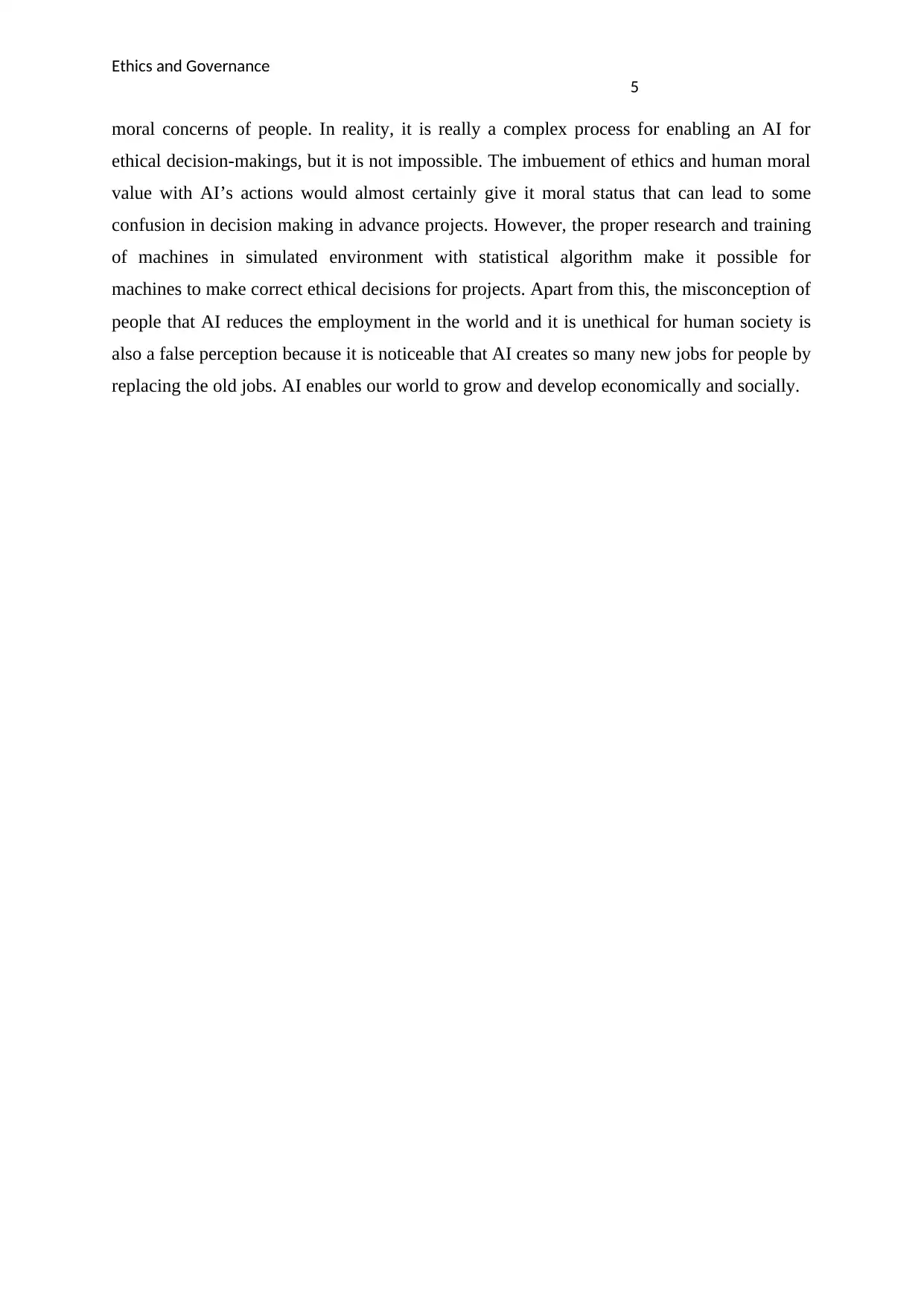
Ethics and Governance
5
moral concerns of people. In reality, it is really a complex process for enabling an AI for
ethical decision-makings, but it is not impossible. The imbuement of ethics and human moral
value with AI’s actions would almost certainly give it moral status that can lead to some
confusion in decision making in advance projects. However, the proper research and training
of machines in simulated environment with statistical algorithm make it possible for
machines to make correct ethical decisions for projects. Apart from this, the misconception of
people that AI reduces the employment in the world and it is unethical for human society is
also a false perception because it is noticeable that AI creates so many new jobs for people by
replacing the old jobs. AI enables our world to grow and develop economically and socially.
5
moral concerns of people. In reality, it is really a complex process for enabling an AI for
ethical decision-makings, but it is not impossible. The imbuement of ethics and human moral
value with AI’s actions would almost certainly give it moral status that can lead to some
confusion in decision making in advance projects. However, the proper research and training
of machines in simulated environment with statistical algorithm make it possible for
machines to make correct ethical decisions for projects. Apart from this, the misconception of
people that AI reduces the employment in the world and it is unethical for human society is
also a false perception because it is noticeable that AI creates so many new jobs for people by
replacing the old jobs. AI enables our world to grow and develop economically and socially.
⊘ This is a preview!⊘
Do you want full access?
Subscribe today to unlock all pages.

Trusted by 1+ million students worldwide
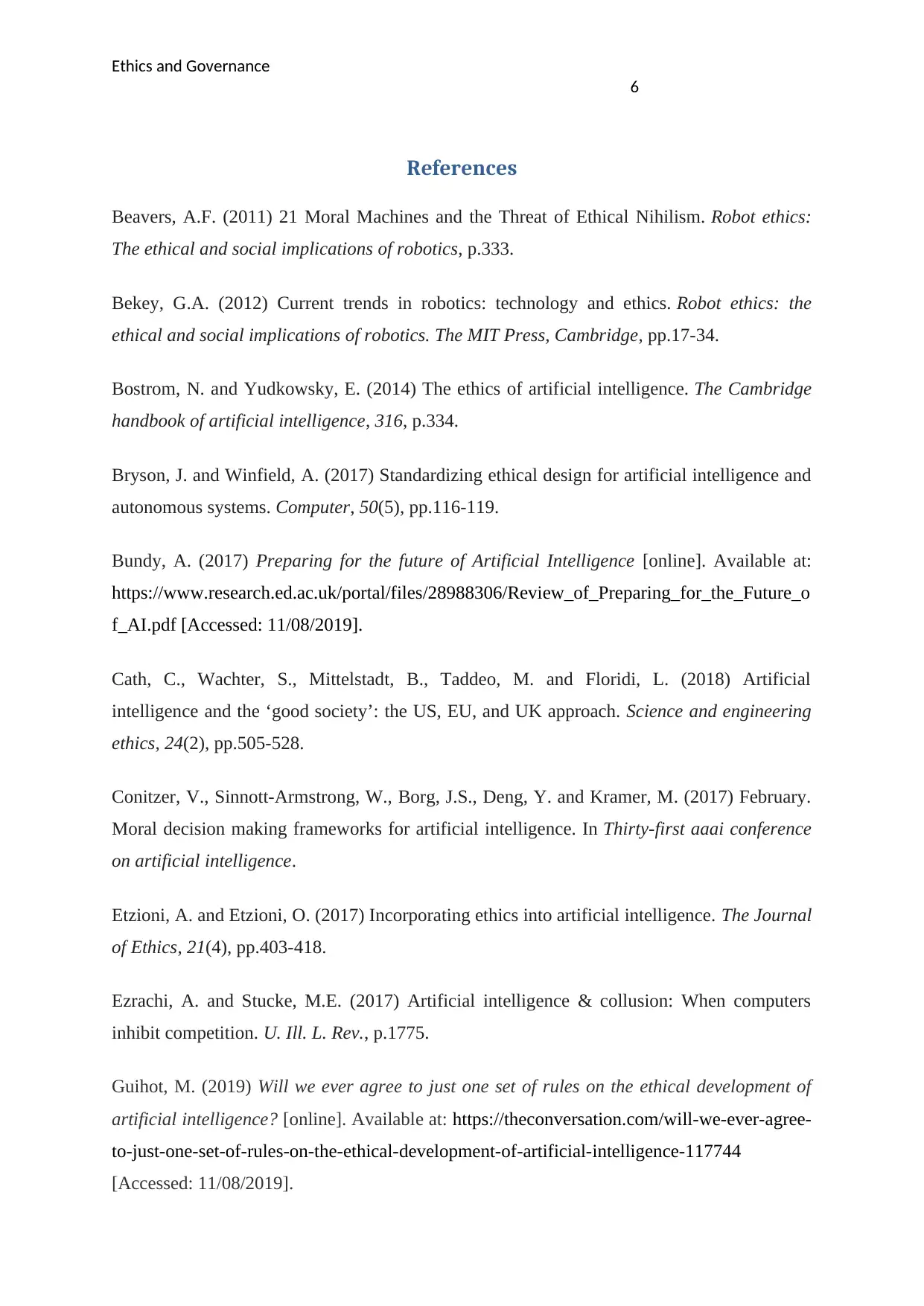
Ethics and Governance
6
References
Beavers, A.F. (2011) 21 Moral Machines and the Threat of Ethical Nihilism. Robot ethics:
The ethical and social implications of robotics, p.333.
Bekey, G.A. (2012) Current trends in robotics: technology and ethics. Robot ethics: the
ethical and social implications of robotics. The MIT Press, Cambridge, pp.17-34.
Bostrom, N. and Yudkowsky, E. (2014) The ethics of artificial intelligence. The Cambridge
handbook of artificial intelligence, 316, p.334.
Bryson, J. and Winfield, A. (2017) Standardizing ethical design for artificial intelligence and
autonomous systems. Computer, 50(5), pp.116-119.
Bundy, A. (2017) Preparing for the future of Artificial Intelligence [online]. Available at:
https://www.research.ed.ac.uk/portal/files/28988306/Review_of_Preparing_for_the_Future_o
f_AI.pdf [Accessed: 11/08/2019].
Cath, C., Wachter, S., Mittelstadt, B., Taddeo, M. and Floridi, L. (2018) Artificial
intelligence and the ‘good society’: the US, EU, and UK approach. Science and engineering
ethics, 24(2), pp.505-528.
Conitzer, V., Sinnott-Armstrong, W., Borg, J.S., Deng, Y. and Kramer, M. (2017) February.
Moral decision making frameworks for artificial intelligence. In Thirty-first aaai conference
on artificial intelligence.
Etzioni, A. and Etzioni, O. (2017) Incorporating ethics into artificial intelligence. The Journal
of Ethics, 21(4), pp.403-418.
Ezrachi, A. and Stucke, M.E. (2017) Artificial intelligence & collusion: When computers
inhibit competition. U. Ill. L. Rev., p.1775.
Guihot, M. (2019) Will we ever agree to just one set of rules on the ethical development of
artificial intelligence? [online]. Available at: https://theconversation.com/will-we-ever-agree-
to-just-one-set-of-rules-on-the-ethical-development-of-artificial-intelligence-117744
[Accessed: 11/08/2019].
6
References
Beavers, A.F. (2011) 21 Moral Machines and the Threat of Ethical Nihilism. Robot ethics:
The ethical and social implications of robotics, p.333.
Bekey, G.A. (2012) Current trends in robotics: technology and ethics. Robot ethics: the
ethical and social implications of robotics. The MIT Press, Cambridge, pp.17-34.
Bostrom, N. and Yudkowsky, E. (2014) The ethics of artificial intelligence. The Cambridge
handbook of artificial intelligence, 316, p.334.
Bryson, J. and Winfield, A. (2017) Standardizing ethical design for artificial intelligence and
autonomous systems. Computer, 50(5), pp.116-119.
Bundy, A. (2017) Preparing for the future of Artificial Intelligence [online]. Available at:
https://www.research.ed.ac.uk/portal/files/28988306/Review_of_Preparing_for_the_Future_o
f_AI.pdf [Accessed: 11/08/2019].
Cath, C., Wachter, S., Mittelstadt, B., Taddeo, M. and Floridi, L. (2018) Artificial
intelligence and the ‘good society’: the US, EU, and UK approach. Science and engineering
ethics, 24(2), pp.505-528.
Conitzer, V., Sinnott-Armstrong, W., Borg, J.S., Deng, Y. and Kramer, M. (2017) February.
Moral decision making frameworks for artificial intelligence. In Thirty-first aaai conference
on artificial intelligence.
Etzioni, A. and Etzioni, O. (2017) Incorporating ethics into artificial intelligence. The Journal
of Ethics, 21(4), pp.403-418.
Ezrachi, A. and Stucke, M.E. (2017) Artificial intelligence & collusion: When computers
inhibit competition. U. Ill. L. Rev., p.1775.
Guihot, M. (2019) Will we ever agree to just one set of rules on the ethical development of
artificial intelligence? [online]. Available at: https://theconversation.com/will-we-ever-agree-
to-just-one-set-of-rules-on-the-ethical-development-of-artificial-intelligence-117744
[Accessed: 11/08/2019].
Paraphrase This Document
Need a fresh take? Get an instant paraphrase of this document with our AI Paraphraser
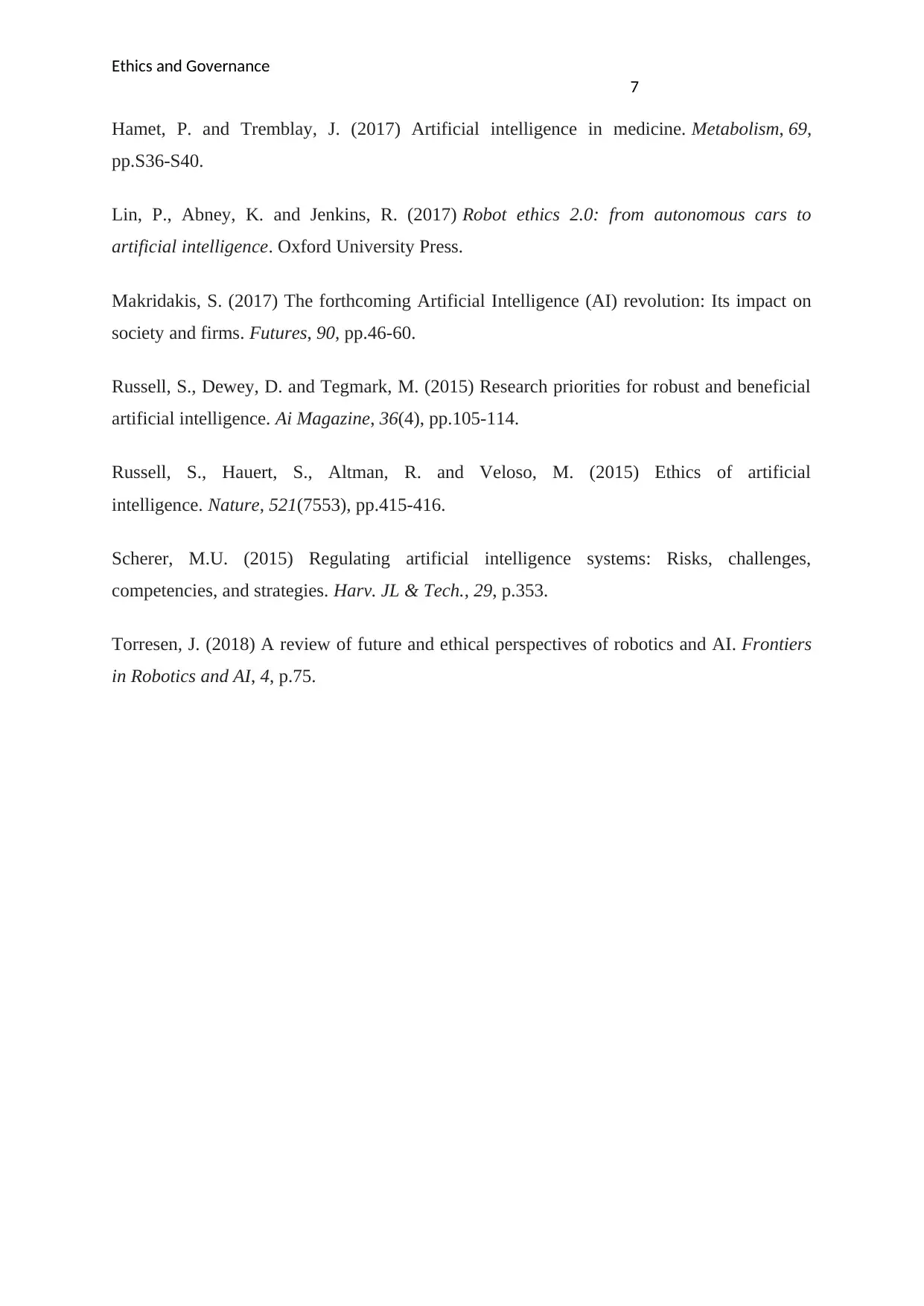
Ethics and Governance
7
Hamet, P. and Tremblay, J. (2017) Artificial intelligence in medicine. Metabolism, 69,
pp.S36-S40.
Lin, P., Abney, K. and Jenkins, R. (2017) Robot ethics 2.0: from autonomous cars to
artificial intelligence. Oxford University Press.
Makridakis, S. (2017) The forthcoming Artificial Intelligence (AI) revolution: Its impact on
society and firms. Futures, 90, pp.46-60.
Russell, S., Dewey, D. and Tegmark, M. (2015) Research priorities for robust and beneficial
artificial intelligence. Ai Magazine, 36(4), pp.105-114.
Russell, S., Hauert, S., Altman, R. and Veloso, M. (2015) Ethics of artificial
intelligence. Nature, 521(7553), pp.415-416.
Scherer, M.U. (2015) Regulating artificial intelligence systems: Risks, challenges,
competencies, and strategies. Harv. JL & Tech., 29, p.353.
Torresen, J. (2018) A review of future and ethical perspectives of robotics and AI. Frontiers
in Robotics and AI, 4, p.75.
7
Hamet, P. and Tremblay, J. (2017) Artificial intelligence in medicine. Metabolism, 69,
pp.S36-S40.
Lin, P., Abney, K. and Jenkins, R. (2017) Robot ethics 2.0: from autonomous cars to
artificial intelligence. Oxford University Press.
Makridakis, S. (2017) The forthcoming Artificial Intelligence (AI) revolution: Its impact on
society and firms. Futures, 90, pp.46-60.
Russell, S., Dewey, D. and Tegmark, M. (2015) Research priorities for robust and beneficial
artificial intelligence. Ai Magazine, 36(4), pp.105-114.
Russell, S., Hauert, S., Altman, R. and Veloso, M. (2015) Ethics of artificial
intelligence. Nature, 521(7553), pp.415-416.
Scherer, M.U. (2015) Regulating artificial intelligence systems: Risks, challenges,
competencies, and strategies. Harv. JL & Tech., 29, p.353.
Torresen, J. (2018) A review of future and ethical perspectives of robotics and AI. Frontiers
in Robotics and AI, 4, p.75.
1 out of 8
Related Documents
Your All-in-One AI-Powered Toolkit for Academic Success.
+13062052269
info@desklib.com
Available 24*7 on WhatsApp / Email
![[object Object]](/_next/static/media/star-bottom.7253800d.svg)
Unlock your academic potential
Copyright © 2020–2025 A2Z Services. All Rights Reserved. Developed and managed by ZUCOL.




